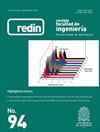轮式移动机器人自适应轨迹跟踪控制的研究
IF 0.5
Q3 ENGINEERING, MULTIDISCIPLINARY
Revista Facultad De Ingenieria-universidad De Antioquia
Pub Date : 2021-02-13
DOI:10.19053/01211129.V30.N55.2021.12022
引用次数: 3
摘要
应用于微分运动移动机器人的经典建模和控制方法产生了近似系统动力学的数学方程,并且当系统在特定范围内为线性时工作得相对较好。然而,当动态随时间变化或发生干扰时,它们的精度可能较低。为了解决这个问题,我们使用了递归最小二乘(RLS)方法,该方法使用了一个带有外生变量的离散时间结构一阶自回归模型(ARX)。在相位裕度和极点配置方面设计并改进了PID自适应自调整控制器。该方法的主要贡献在于它允许机器人模型和自适应自调整PID控制器参数的永久在线更新。此外,将Lyapunov稳定性分析技术应用于路径和轨迹跟踪控制,使机器人在执行给定任务时产生的定位和方向误差渐近为零。PID自适应自调节控制器的性能通过误差积分标准的实现来测量,该标准允许1 Instituto Tecnológico Metropolitano (Medellín-Antioquia,哥伦比亚)。guiovannysuarez97899@correo.itm.edu.co。ORCID: 0000-0003-4131-9280 2 M. Sc. politcims . Colombiano Jaime Isaza Cadavid (Medellín-Antioquia,哥伦比亚)。ndmunoz@elpoli.edu.co。ORCID: 0000-0002-4696-8151 3 M Sc. Instituto Tecnológico Metropolitano (Medellín-Antioquia,哥伦比亚)。henryvasquez@itm.edu.co。ORCID: 0000-0001-5428-0253 revsta faculty de Ingeniería (Rev. Fac.)荷兰国际集团(Ing))。卷30 (55),e12022。1 - 2021。Tunja-Boyaca,哥伦比亚。L-ISSN: 0121-1129, e-ISSN: 2357-5328。DOI: https://doi.org/10.19053/01211129.v30.n55.2021.12022确定最佳性能的控制器,在这种情况下,PID自适应自调整类型的极点配置,允许移动机器人更精确地跟踪所分配的轨迹和路径,以及更少的机械和能量磨损,由于其平滑和精确的运动。本文章由计算机程序翻译,如有差异,请以英文原文为准。
Development of an Adaptive Trajectory Tracking Control of Wheeled Mobile Robot
Classical modeling and control methods applied to differential locomotion mobile robots generate mathematical equations that approximate the dynamics of the system and work relatively well when the system is linear in a specific range. However, they may have low accuracy when there are many variations of the dynamics over time or disturbances occur. To solve this problem, we used a recursive least squares (RLS) method that uses a discrete-time structure first-order autoregressive model with exogenous variable (ARX). We design and modify PID adaptive self-adjusting controllers in phase margin and pole allocation. The main contribution of this methodology is that it allows the permanent and online update of the robot model and the parameters of the adaptive self-adjusting PID controllers. In addition, a Lyapunov stability analysis technique was implemented for path and trajectory tracking control, this makes the errors generated in the positioning and orientation of the robot when performing a given task tend asymptotically to zero. The performance of the PID adaptive self-adjusting controllers is measured through the implementation of the criteria of the integral of the error, which allows to 1 Instituto Tecnológico Metropolitano (Medellín-Antioquia, Colombia). guiovannysuarez97899@correo.itm.edu.co. ORCID: 0000-0003-4131-9280 2 M. Sc. Politécnico Colombiano Jaime Isaza Cadavid (Medellín-Antioquia, Colombia). ndmunoz@elpoli.edu.co. ORCID: 0000-0002-4696-8151 3 M Sc. Instituto Tecnológico Metropolitano (Medellín-Antioquia, Colombia). henryvasquez@itm.edu.co. ORCID: 0000-0001-5428-0253 Revista Facultad de Ingeniería (Rev. Fac. Ing.) Vol. 30 (55), e12022. January-March 2021. Tunja-Boyacá, Colombia. L-ISSN: 0121-1129, e-ISSN: 2357-5328. DOI: https://doi.org/10.19053/01211129.v30.n55.2021.12022 determine the controller of best performance, being in this case, the PID adaptive self-adjusting type in pole assignment, allowing the mobile robot greater precision in tracking the trajectories and paths assigned, as well as less mechanical and energy wear, due to its smooth and precise movements.
求助全文
通过发布文献求助,成功后即可免费获取论文全文。
去求助
来源期刊
CiteScore
2.00
自引率
0.00%
发文量
27
审稿时长
2 months
期刊介绍:
Revista Facultad de Ingenieria started in 1984 and is a publication of the School of Engineering at the University of Antioquia.
The main objective of the journal is to promote and stimulate the publishing of national and international scientific research results. The journal publishes original articles, resulting from scientific research, experimental and or simulation studies in engineering sciences, technology, and similar disciplines (Electronics, Telecommunications, Bioengineering, Biotechnology, Electrical, Computer Science, Mechanical, Chemical, Environmental, Materials, Sanitary, Civil and Industrial Engineering).
In exceptional cases, the journal will publish insightful articles related to current important subjects, or revision articles representing a significant contribution to the contextualization of the state of the art in a known relevant topic. Case reports will only be published when those cases are related to studies in which the validity of a methodology is being proven for the first time, or when a significant contribution to the knowledge of an unexplored system can be proven.
All published articles have undergone a peer review process, carried out by experts recognized for their knowledge and contributions to the relevant field.
To adapt the Journal to international standards and to promote the visibility of the published articles; and therefore, to have a greater impact in the global academic community, after November 1st 2013, the journal will accept only manuscripts written in English for reviewing and publication.
Revista Facultad de Ingeniería –redin is entirely financed by University of Antioquia
Since 2015, every article accepted for publication in the journal is assigned a DOI number.

 求助内容:
求助内容: 应助结果提醒方式:
应助结果提醒方式:


